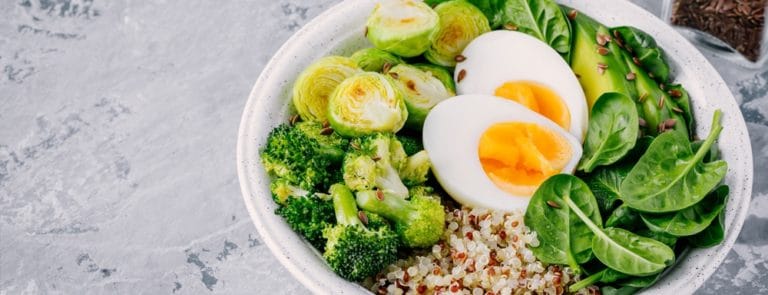15% off €25
Code:SPEND
Are you eating enough choline?

You might not have heard of this nutrient, but choline is essential for brain and liver health. Here's more on this vital nutrient including benefits and food sources.
This essential nutrient is vital for brain and liver health, but not many of us know what it is, or where to find it
Choline is not as well-known as other nutrients, such as vitamin C or calcium, but it is just as important to our wellbeing.
What is choline?
Choline is not technically a vitamin, but it is often grouped together with the B vitamins. It is an essential nutrient, though, which means our bodies need it to function normally.1 Handpicked content: Why take a vitamin-B complex? There are many benefits of choline. We need choline to produce the neurotransmitter acetylcholine, which helps with memory, mood and cognitive function, making it an essential brain food. A large-scale American study, published in the American Journal of Clinical Nutrition in 2011, found that a higher choline intake was linked to better cognitive performance.2 Choline is also important for a healthy liver, regulating homocysteine – an amino acid that has been linked to heart disease – and maintaining our nervous system, which includes muscle movement and regulating our heartbeat.3 Handpicked content: What causes heart disease and am I at risk?How much choline do I need?
We do not produce enough choline ourselves for optimum health, so it’s important we get the rest from our diet. In 2016, the European Food Safety Authority set the daily adequate intake (AI) for choline at 400mg for adults.4 This amount was decided upon after analysing how much choline healthy populations usually eat, and the amount of choline we would need to replenish our body in a deficiency. Handpicked content: Spotlight on cholineWhere to find choline in your diet
The richest food sources of choline are animal products, such as beef liver and egg yolks5– vegetarians and vegans often tend to be low in choline for this reason. But there are plenty of veggie sources high in choline6 too:- wheatgerm (toasted)
- brussels sprouts
- broccoli
- peanut butter
- cauliflower
- soybeans
- flaxseeds
Advice is for information only and should not replace medical care. Please check with your GP before trying any remedies.
Sources- Zeisek SH and da Costa KA. Choline: An Essential Nutrient for Public Health. Available from: https://www.ncbi.nlm.nih.gov/pmc/articles/PMC2782876/
- Poly C, et al. The relation of dietary choline to cognitive performance and white-matter hyperintensity in the Framingham Offspring Cohort. Available from: https://www.ncbi.nlm.nih.gov/pubmed/22071706
- Healthline. What Is Choline? An Essential Nutrient With Many Benefits. Available from: https://www.healthline.com/nutrition/what-is-choline#section2
- European Food Safety Authority. Dietary reference values: EFSA publishes advice on choline. Available from: https://www.efsa.europa.eu/en/press/news/160817
- US Department of Agriculture. USDA Database for the Choline Content of Common Foods. Available from: https://www.ars.usda.gov/ARSUserFiles/80400525/Data/Choline/Choln02.pdf
- As above



